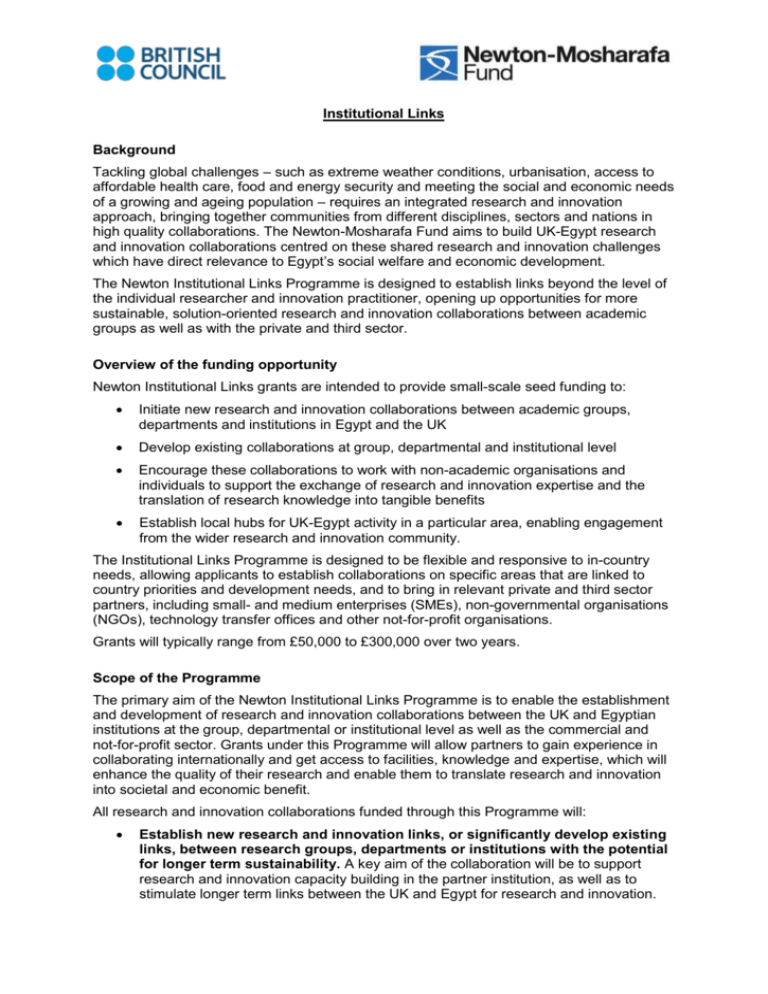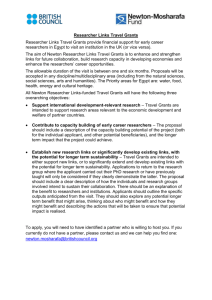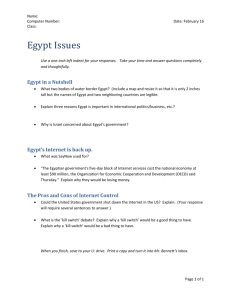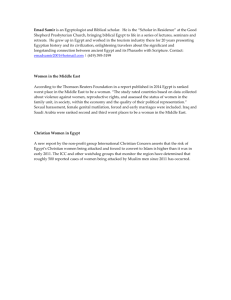Institutional Links Background Tackling global challenges – such as
advertisement

Institutional Links Background Tackling global challenges – such as extreme weather conditions, urbanisation, access to affordable health care, food and energy security and meeting the social and economic needs of a growing and ageing population – requires an integrated research and innovation approach, bringing together communities from different disciplines, sectors and nations in high quality collaborations. The Newton-Mosharafa Fund aims to build UK-Egypt research and innovation collaborations centred on these shared research and innovation challenges which have direct relevance to Egypt’s social welfare and economic development. The Newton Institutional Links Programme is designed to establish links beyond the level of the individual researcher and innovation practitioner, opening up opportunities for more sustainable, solution-oriented research and innovation collaborations between academic groups as well as with the private and third sector. Overview of the funding opportunity Newton Institutional Links grants are intended to provide small-scale seed funding to: Initiate new research and innovation collaborations between academic groups, departments and institutions in Egypt and the UK Develop existing collaborations at group, departmental and institutional level Encourage these collaborations to work with non-academic organisations and individuals to support the exchange of research and innovation expertise and the translation of research knowledge into tangible benefits Establish local hubs for UK-Egypt activity in a particular area, enabling engagement from the wider research and innovation community. The Institutional Links Programme is designed to be flexible and responsive to in-country needs, allowing applicants to establish collaborations on specific areas that are linked to country priorities and development needs, and to bring in relevant private and third sector partners, including small- and medium enterprises (SMEs), non-governmental organisations (NGOs), technology transfer offices and other not-for-profit organisations. Grants will typically range from £50,000 to £300,000 over two years. Scope of the Programme The primary aim of the Newton Institutional Links Programme is to enable the establishment and development of research and innovation collaborations between the UK and Egyptian institutions at the group, departmental or institutional level as well as the commercial and not-for-profit sector. Grants under this Programme will allow partners to gain experience in collaborating internationally and get access to facilities, knowledge and expertise, which will enhance the quality of their research and enable them to translate research and innovation into societal and economic benefit. All research and innovation collaborations funded through this Programme will: Establish new research and innovation links, or significantly develop existing links, between research groups, departments or institutions with the potential for longer term sustainability. A key aim of the collaboration will be to support research and innovation capacity building in the partner institution, as well as to stimulate longer term links between the UK and Egypt for research and innovation. Benefit the wider research and innovation community with the potential to increase its capacity to translate research into economic or societal benefit. Applicants should indicate how they envisage this occurring. Focus on topics or themes which have relevance to the economic and social development of Egypt. Institutional Links grants are intended to support areas relevant to the economic development and social welfare of Egypt. Institutional Links grants can cover costs which support research and innovation collaboration, including research-related costs; the exchange between partners of researchers, students and industry staff (including SMEs and not-for-profit organisations); the costs of organising meetings, seminars, training; and other activities to establish and strengthen collaborative links. Institutional Links-funded collaborations may also be established as UK-Egypt centres of excellence – based in Egypt – in a particular research area, acting as a resource hub for the wider research community in-country and a focal point for other activities (e.g. seminars, technical training workshops). Grants can also include support for training technical staff, and a limited amount of funding for the purchase of equipment and consumables, or financing of other activity necessary for the translation of the research into benefit, thereby laying the foundations for longer term impact on the research and innovation landscape. All expenditure must be detailed in the budget request and a justification of costs included. Funding available Applicants may submit proposals requesting funding between £50,000 and £300,000. Institutional Links grants are intended to support the direct costs of establishing and operating your collaboration (i.e. costs directly related to implementing activities contained in the proposal). The following section details the costs that can and cannot be included in your budget request. Institutional Links grants can cover: Research-related costs: o Essential scientific equipment1. o Consumables5 (including scientific software licences dedicated to the collaboration) o Access to facilities or library services o Appropriate fieldwork costs essential to the operation of the collaboration (including but not limited to costs for research/data collection staff in Egypt), The maximum proportion of the total grant value that can be requested to cover research-related costs is 30%. 1 Human resources costs including but not limited to: staff costs of temporary research personnel dedicated to the collaboration, research assistant fees (specifically for the collaboration but not regular salary-/payroll-related costs). The costs of permanent staff or existing positions cannot be included. Publication costs and associated publishing and communications costs (including web page development by external providers, if appropriate) directly related to the collaboration Budget requests pertaining to these costs have to include any VAT costs, delivery and installation. Short-term room hire for meetings, training events, seminars and conferences integral to the collaboration and any additional costs pertaining to these activities (e.g. projector, flip charts) Basic catering costs associated with events or meetings directly relating to the collaboration (these must be justified in the budget breakdown), unless specified otherwise Travel (usually economy class, or premium economy class if justified) and subsistence costs in line with British Council policies Visa fees, vaccinations, medical insurance for visitors (if required for travel to Egypt or the UK) Bank charges for transfer of funds from the Lead Institution to Associated Partners to cover their travel and expenses. The British Council is committed to equal opportunities and diversity and will consider, on a case by case basis, requests for additional support linked to the Institutional Links activity, so long as sufficient justification is provided. Institutional Links grants cannot cover: Staff time or replacement costs for permanent members of staff. It is expected that these costs are covered by participating institutions/organisations as an in-kind contribution. Other staff-related costs (i.e. statutory contributions analogous to UK superannuation or National Insurance) Tuition fees Bench fees Costs relating to the construction, procurement or rental of physical infrastructure (e.g. office buildings, laboratory facilities) are not allowable under this scheme. It is expected that any rooms and facilities essential for the operation of collaboration are provided as an in-kind contribution by the participating institutions, and these can be detailed as an in-kind contribution in the budget breakdown. However, short-term rental of meeting rooms for occasional use (e.g. for wider seminars and workshops) is allowable. Purchase or rental of office equipment (e.g. IT hardware, office software, desks, chairs, filing cabinets, photocopiers, fax machines) Patents or related costs Costs related to writing up previous research Mobile phone rental or purchase Entertainment costs Other indirect costs not listed above.







